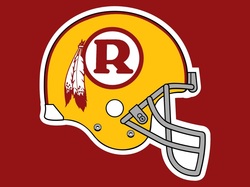
So what better way to return from a hiatus but to throw it back to a trademark that was created this day 83 years ago: the Washington Redskins.
Unless you’ve been living under a rock, you’ve heard about the struggles the Redskins have had in keeping the registration for this trademark. Most recently, these struggles culminated in a cancellation of the registration for the REDSKINS mark by the Trademark Trial and Appeals Board (TTAB), an arm of the United States Patent and Trademark Office (whose decision was upheld by a federal court). But the war isn’t over because the team will appeal the cancellation decision to the next highest court, the Federal Circuit Court of Appeals; And (given the caliber of the issues at stake in this case including free speech rights under the First Amendment), perhaps all the way to the U.S. Supreme Court.
In the latest attempt by the Redskins to preserve their name, the team (well, technically it’s the National Football League, the owner of the REDSKINS trademark) argued that the Lanham Act’s ban against the registration of disparaging trademarks is a violation of the First Amendment, was unconstitutionally vague, and that any taking by the government pursuant to the statute was an unconstitutional taking of property without just compensation. But in its opinion, the district court rejected the claim that the First Amendment had anything to do with the registration of trademarks since the Lanham Act only pertains to registration, not actual use of the mark. So, basically, the Redskins are not prevented from using their trademark as a form of speech; they just are denied the chance to receive a benefit conferred by the registration. Furthermore, the First Amendment, as found by the Supreme Court in a June decision on the use of the Confederate Flag on license plate designs, is a type of government speech because a trademark registration indicates government approval of the mark.
The whole argument about the REDSKINS trademark and the insignificant nature of the ruling, at least from a standpoint of the NFL being able to enforce its rights in the REDSKINS trademark and ensure that it is actually still a trademark, is that there is no “significant” injury to the Redskins or the NFL. Apart from trademark registration, a trademark is protected through actual use in commerce. The source of protection for such rights stems from the common law, a combination of state law and court precedents created by both state and federal courts. The Redskins still have this hugely expansive “penumbra” of common law protection that they can use as a scythe against counterfeiters. Because they have rights under the common law, there is no true injury to speech because actual use of the mark is not denied.
What if that last point isn’t true, and there is a legitimate chance that even the Redskins’ common law trademark interest stands to be invalidated? Here is the issue I, and apparently a few of my colleagues, have with the district court’s decision is that it appears to set-up a slippery-slope as to trademarks being denied protection even under the common law. As avid readers of this blog know by now: trademarks are classified across a spectrum of distinctiveness from generic (i.e. common-place words from the English language that have no source identifying capabilities) to fanciful (made up words that have no foundation in language). A mark that is disparaging does not fit within any of the “preferred” categories along this spectrum where words are given trademark protection under common law. In Arizona (and numerous other states I’m sure) you cannot obtain a registration for a mark that “may disparage… persons, living or dead, institutions, beliefs, or national symbols, or bring them into contempt, or disrepute.” So under state law, a source of common law protection for trademarks, a disparaging mark may not find protection either.
And a reasonable mind could find that the Lanham Act’s common law protection provision under the label “unfair competition” should not be applied to the REDSKINS mark. Indeed as Judge Moore of the Federal Circuit Court of Appeals recently commented in his additional comments in the Slants trademark case:
“Not only is a disparaging trademark denied federal registration, but it cannot be protected by its owner by virtue of a [Section 43(a) - Lanham Act Unfair Competition section] claim… Section 43(a) protection is only available for unregistered trademarks that could have qualified for registration… While denial of registerability and the attendant rights of protection both federal and state do not prevent a trademark owner from using its mark, such denial severely burdens use of such marks. Section 2(a)’s content-based restrictions on registerability were adopted to reduce use of trademarks the government deemed unsuitable (such as those that disparage) – no doubt a chilling effect on speech.” (emphasis in original)
So for now we mark the anniversary that allows us to engage in such a spirited debate about identifiers and team names, celebrating a team that, although the apparent source of tremendous heartache for both fans and non-fans alike, still gives everyone a reason to talk.


 RSS Feed
RSS Feed